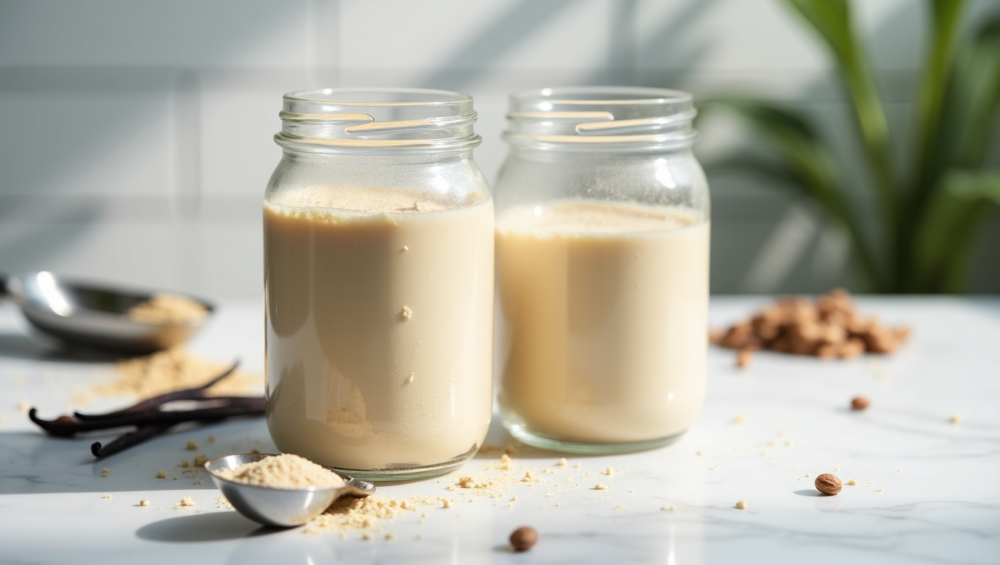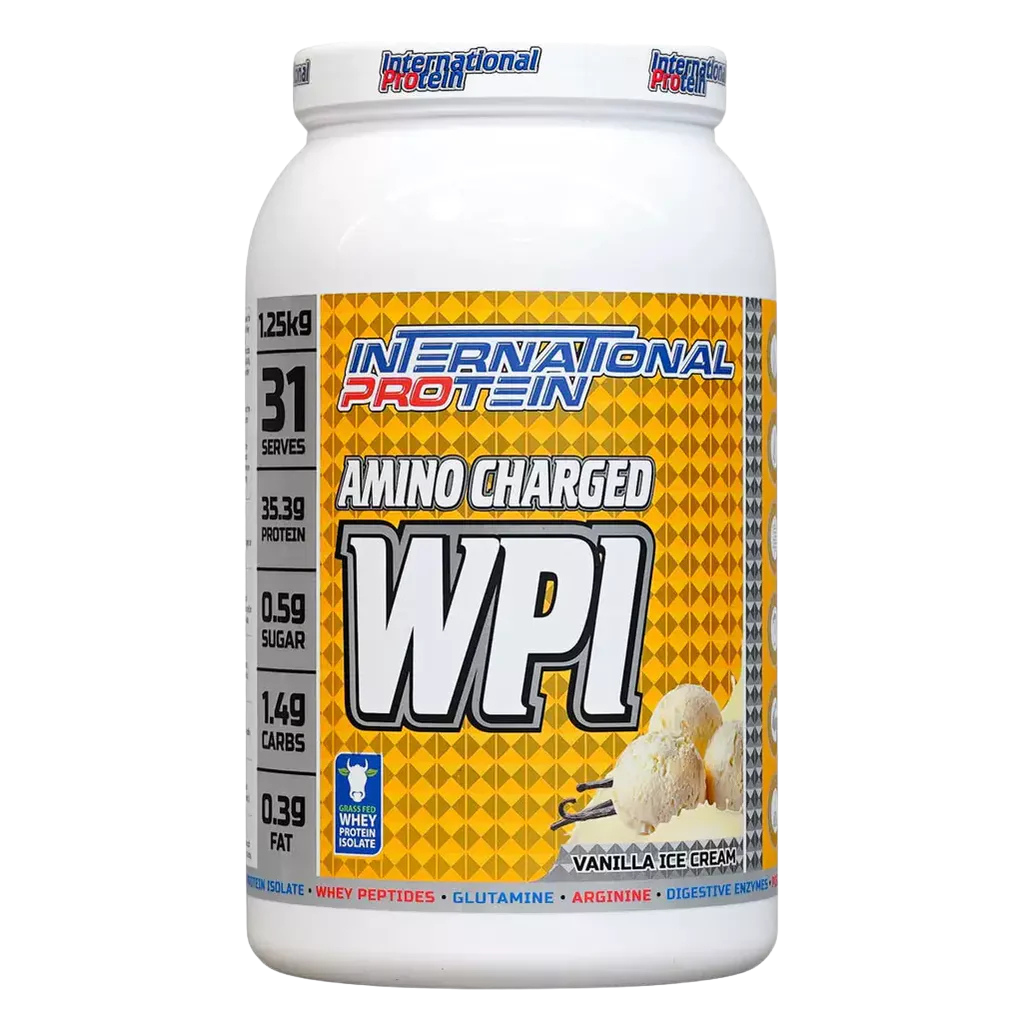Did you find an expired protein powder container in your cabinet and wonder about its safety? Most manufacturers print a two-year expiration date after production, but the actual shelf life might surprise you.
Research shows that whey protein powder lasts between 9-19 months in normal storage conditions (70°F and 35% humidity). The quality decreases steadily, and studies indicate that essential amino acids like lysine can drop from 5.5% to 4.2% after 12 months of storage.
This guide explains everything about expired protein powder. You’ll learn about safety concerns, nutritional changes, and storage methods that extend your supplement’s life. We’ll show you how to spot spoiled protein powder and what happens if you consume it after its expiration date.
Does Protein Powder Really Expire? The Science Explained
Protein powder expiration isn’t as simple as the date printed on your container. Research shows that protein powder stays good for 9-19 months when stored at 70°F with 35% humidity.
Understanding protein powder shelf life
Your protein powder’s shelf life mostly depends on what’s in it and how it’s made. Plant proteins last longer than milk-based ones because they don’t have the same bacterial risks. Most companies add preservatives like maltodextrin and lecithin that help the powder last up to two years.
Factors affecting protein degradation
Your protein powder breaks down faster or slower based on several things:
- Temperature effects: Protein only lasts 9 months at 95°F, but it stays good for 18 months at 70°F
- Moisture exposure: High humidity makes it break down faster
- Processing methods: Gentle processing helps keep proteins stable
- Storage conditions: Good sealing and container care affect how long it lasts by a lot
The Maillard reaction process
The Maillard reaction is a vital process that breaks down protein in your supplement. This reaction happens when proteins meet reducing sugars. The process:
- Creates unstable compounds
- Makes brown pigments
- Reduces protein quality
Research shows this reaction speeds up when water activity reaches 0.60-0.85. The reaction rate goes up 3-4 times with every 10°C temperature increase. That’s why keeping your protein powder at the right temperature matters so much for its quality.
Safety vs. Efficacy: What Happens After Expiration
Your protein powder’s expiration date just passed? Let’s look at what really happens to it. This will help you decide what to do with your supplements.
Impact on protein content and amino acids
The protein quality in your supplement gets worse over time. Research shows lysine (an essential amino acid) drops from 5.5% to 4.2% after 12 months of storage. This makes the powder less effective at building muscle.
Potential health risks and considerations
Expired protein powder rarely causes serious health problems, but you might experience:
- Bloating and gas
- Mild stomach upset or nausea
- Bacteria growth if moisture gets into the container
Important note: These symptoms usually show up only when the powder has clear signs of spoilage.
Changes in nutritional value over time
Your protein powder’s nutritional value changes in several ways:
- Overall protein quality goes down slowly
- Your body can’t use the amino acids as well for muscle building
- The powder doesn’t help muscle recovery as much
Eating protein powder shortly after its expiration date is usually safe, but it won’t build muscle as well. The Maillard browning process makes the powder less complete as a protein source, which means it won’t help you reach your fitness goals as effectively.
You might notice the powder doesn’t mix as well and tastes different – signs that its quality is dropping. These changes don’t mean the powder is unsafe – they just show it’s not working as well as it should.
How to Test If Your Protein Powder Has Gone Bad
Let’s look at some reliable ways to check if your protein powder has gone bad before you throw it away. We’ll get into each testing method to help you decide what to do.
Visual inspection methods
Take a good look at your protein powder’s appearance. Fresh protein powder should have the same color throughout. Watch out for any odd discoloration, especially yellowish or brownish tints that could mean oxidation. In fact, you should throw the powder away right away if you see any mold or strange specks.
Smell and taste assessment
Your nose knows best when it comes to spotting spoilage. Fresh protein powder usually has a neutral or slightly sweet smell. So if you catch any sour, rancid, or strong odors, your powder has probably gone bad.
To test the taste:
- Mix a small amount with water
- Look for bitter or unusual flavors
- Check for any cardboard-like taste
- Watch for texture changes
Moisture and clumping checks
Moisture is usually the main reason protein powder goes bad. Here’s what you should look for:
- Powder that’s clumping or caking together
- Texture changes when you rub it between your fingers
- Problems mixing it with liquid
- Hard lumps forming
Important warning: Even a little moisture can make your protein powder less effective. The powder should mix smoothly – if it leaves strange lumps after good mixing, its quality might have dropped.
Note that good protein powder should dissolve easily without lumps. Some clumping doesn’t always mean it’s spoiled, but it might affect the product’s quality and how well it mixes.
Smart Storage Solutions to Extend Shelf Life
The quality and shelf life of your protein powder depends on proper storage. The right storage conditions prevent early degradation and help maintain its nutritional value.
Optimal temperature and humidity conditions
Your protein powder needs the right environment to stay fresh. Studies show protein powder stays best between 50-70°F. You should store your supplements in:
- A cool pantry or kitchen cabinet
- Away from direct sunlight
- Far from heat-generating appliances
- In spaces with low humidity levels
- Away from strong-smelling items
Container selection and maintenance
The right container makes a big difference in your protein powder’s preservation. These features work best:
- Airtight sealing capability
- BPA-free materials
- Protection from UV rays
- Moisture-resistant properties
- Proper size for easy handling
Your hands and measuring scoops should stay completely dry before handling the powder.
Common storage mistakes to avoid
Knowing what not to do helps keep your protein powder fresh. Research shows protein quality drops faster at temperatures above 95°F. Here are mistakes you need to avoid:
- Storing in the refrigerator (causes moisture buildup)
- Using wet scoops or hands
- Leaving containers partially sealed
- Keeping near heat sources
- Ignoring expiration dates
It’s worth mentioning that whey protein stays good for up to 19 months in proper storage conditions (70°F and 35% humidity). These guidelines will help your supplement last longer and work better for your fitness goals.
Conclusion
Knowledge about protein powder expiration helps you make better supplement choices. Your protein powder stays safe shortly after its expiration date. However, its effectiveness drops due to chemical processes like the Maillard reaction and amino acid breakdown.
Storage makes the most important difference in keeping your protein powder fresh. Your supplements will last up to 19 months when you store them between 50-70°F. Keep them away from moisture in proper containers. Look for spoilage signs through visual checks, smell tests, and moisture levels before throwing away expired powder.
Note that safety is different from effectiveness. Expired protein powder rarely causes health problems, but its muscle-building benefits decrease over time. Good storage habits and regular quality checks will help your supplements stay nutritious and effective for your fitness journey.





